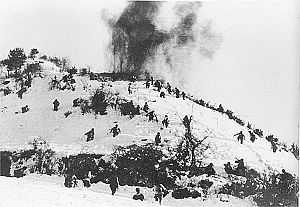1950 in the People's Republic of China
From Wikipedia, the free encyclopedia
| ««« 1949 1948 1947 |
|
»»» 1951 1952 1953 | ||||||
| ||||||||
Events in the year 1950 in the People's Republic of China.
Incumbents
Events

Battle of the Ch'ongch'on River: Chinese forces swarm a UN position.
- January 6 – The United Kingdom recognizes the People's Republic of China; the Republic of China severs diplomatic relations with Britain in response.
- January 9 – The Israeli government recognizes the People's Republic of China.
- January 13 – Finland forms diplomatic relations with the People's Republic of China.
- January 31 – The last Kuomintang troops surrender in mainland China.
- February 14 – Cold War: The Soviet Union and the People's Republic of China sign a mutual defense treaty.
- March 5-May 1 – Chinese Civil War: Landing Operation on Hainan Island – a series of battles fought in the Chinese province of Hainan between the nationalists and the communists during Chinese Civil War which resulted in the communist victory.
- October 7 – Invasion of Tibet: 40,000 troops of the People's Liberation Army invaded the Tibetan area of Chamdo. The large number of units of the PLA quickly surrounded the outnumbered Tibetan forces. By October 19, 1950, the 5,000 Tibetan troops had surrendered.[1]
- November 25 – Korean War: Forces from the People's Republic of China commenced the Second Phase Campaign. The resulting battles at Ch'ongch'on River and Chosin Reservoir expelled the United Nations forces from North Korea.
Births
- July 3 – Zhang Kangkang, Chinese writer
Deaths
- October 27 – Ren Bishi, a leading figure in the Chinese Communist Party
- November 25 – Mao Anying, the eldest son of Mao Zedong and Yang Kaihui. Anying was killed in action by an air strike during the Korean War.
See also
- 1950 in Chinese film
References
- ↑ Laird, Thomas. The Story of Tibet: Conversations with the Dalai Lama (2006) Grove Press. p. 301
| ||||||||||||||||||||||||||||
This article is issued from Wikipedia. The text is available under the Creative Commons Attribution/Share Alike; additional terms may apply for the media files.

